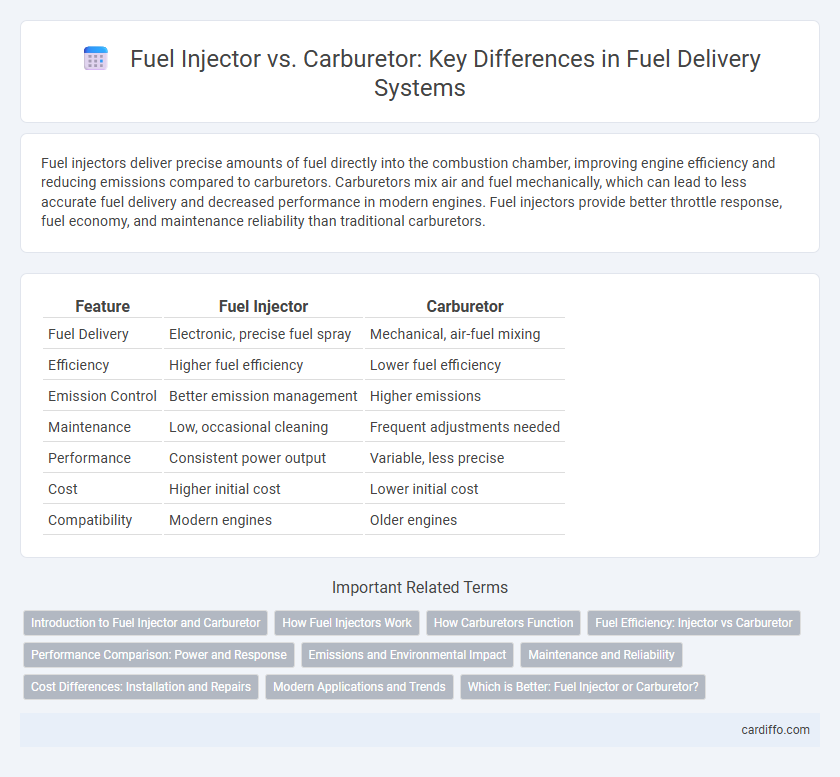Fuel injectors deliver precise amounts of fuel directly into the combustion chamber, improving engine efficiency and reducing emissions compared to carburetors. Carburetors mix air and fuel mechanically, which can lead to less accurate fuel delivery and decreased performance in modern engines. Fuel injectors provide better throttle response, fuel economy, and maintenance reliability than traditional carburetors.
Table of Comparison
| Feature | Fuel Injector | Carburetor |
|---|---|---|
| Fuel Delivery | Electronic, precise fuel spray | Mechanical, air-fuel mixing |
| Efficiency | Higher fuel efficiency | Lower fuel efficiency |
| Emission Control | Better emission management | Higher emissions |
| Maintenance | Low, occasional cleaning | Frequent adjustments needed |
| Performance | Consistent power output | Variable, less precise |
| Cost | Higher initial cost | Lower initial cost |
| Compatibility | Modern engines | Older engines |
Introduction to Fuel Injector and Carburetor
Fuel injectors precisely deliver atomized fuel directly into the combustion chamber or intake manifold, improving fuel efficiency and reducing emissions. Carburetors mechanically mix air and fuel by drawing fuel through jets into an airstream, commonly used in older gasoline engines. Advances in fuel injection technology have largely replaced carburetors in modern vehicles due to superior control and performance.
How Fuel Injectors Work
Fuel injectors work by precisely spraying a fine mist of fuel directly into the combustion chamber or intake manifold, ensuring optimal air-fuel mixture for efficient combustion. These electronically controlled valves regulate fuel delivery based on engine speed, load, and temperature, enhancing performance and reducing emissions. Unlike carburetors, fuel injectors provide accurate fuel metering and quicker response times, contributing to improved fuel economy and engine reliability.
How Carburetors Function
Carburetors function by mixing air and fuel in precise proportions before delivering the mixture to the engine cylinders for combustion. They use a venturi tube to create a vacuum that draws fuel from the float chamber, atomizing it with incoming air. This simple mechanical process controls engine speed and power output by regulating the airflow and fuel flow simultaneously.
Fuel Efficiency: Injector vs Carburetor
Fuel injectors deliver precise amounts of fuel directly into the combustion chamber, enhancing fuel atomization and combustion efficiency, resulting in significantly better fuel economy compared to carburetors. Carburetors rely on a mechanical process that mixes air and fuel, often causing inconsistent fuel flow and higher consumption rates. Modern vehicles with fuel injectors can achieve up to 15-20% improved fuel efficiency over traditional carburetor systems.
Performance Comparison: Power and Response
Fuel injectors deliver precise fuel metering and atomization, resulting in improved engine power and faster throttle response compared to carburetors. Carburetors, relying on mechanical fuel mixing, often produce less consistent air-fuel ratios, limiting peak performance and responsiveness under varying conditions. Modern fuel injection systems enhance combustion efficiency and acceleration, making them superior for high-performance applications.
Emissions and Environmental Impact
Fuel injectors deliver precise fuel metering, resulting in more complete combustion and significantly lower hydrocarbon and carbon monoxide emissions compared to carburetors. Carburetors often cause richer air-fuel mixtures, increasing unburned fuel emissions and contributing to higher environmental pollution. Modern fuel injection systems improve fuel efficiency and reduce nitrogen oxide emissions, making them more eco-friendly and compliant with stringent emission standards.
Maintenance and Reliability
Fuel injectors offer precise fuel delivery, enhancing engine efficiency and reducing maintenance frequency compared to carburetors, which require regular adjustments and cleaning due to mechanical wear and fuel residue buildup. Carburetors are more prone to clogging and inconsistent fuel-air mixture, leading to frequent tune-ups and reduced reliability over time. Fuel injectors, supported by electronic controls, maintain consistent performance and reliability, minimizing downtime and maintenance costs.
Cost Differences: Installation and Repairs
Fuel injectors typically have higher initial installation costs compared to carburetors due to their complex electronic components and precision engineering. Repair expenses for fuel injectors can also be more expensive, as diagnosing and replacing faulty injectors often requires specialized equipment and professional expertise. In contrast, carburetors offer lower installation and repair costs because of their simpler mechanical design and widespread availability of replacement parts.
Modern Applications and Trends
Fuel injectors dominate modern automotive applications due to their precision in delivering optimal air-fuel mixtures, enhancing fuel efficiency and reducing emissions compared to carburetors. Electronic control units (ECUs) closely monitor and adjust fuel injection timing and quantity, enabling better performance and compliance with stringent emission standards. While carburetors remain in vintage and small-engine contexts, fuel injector systems are the prevailing technology in contemporary vehicles and advanced engine designs.
Which is Better: Fuel Injector or Carburetor?
Fuel injectors provide precise fuel delivery directly into the combustion chamber, improving engine efficiency and reducing emissions compared to carburetors, which mix air and fuel mechanically and are less accurate. Modern vehicles typically favor fuel injectors due to better fuel economy, smoother throttle response, and easier maintenance. However, carburetors remain popular in older or classic engines for their simplicity and ease of repair without electronic components.
Fuel Injector vs Carburetor Infographic

 cardiffo.com
cardiffo.com